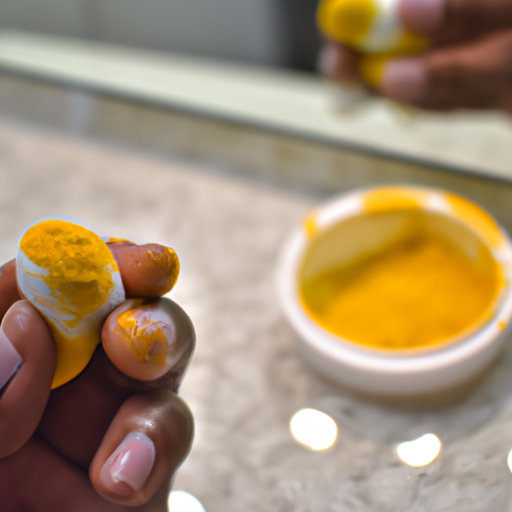As a dental assistant, I have witnessed numerous patients facing challenges with gum infections. These issues, commonly referred to as periodontal diseases, can result in significant harm to both the gums and teeth if not addressed promptly.
While proper oral hygiene, including regular brushing and flossing, is essential for preventing gum infections, some people may still develop the condition due to various factors, including genetics, smoking, and certain medical conditions.
Recently, there has been growing interest in using turmeric as a natural remedy for gum infections. Turmeric, a spice commonly used in Indian and Middle Eastern cuisines, contains a powerful compound called curcumin, which has been shown to have anti-inflammatory, antimicrobial, and antioxidant properties.
In this article, we will explore whether turmeric is a viable option for treating gum infections, and what the research says about its effectiveness.
Key Takeaways
- Turmeric contains curcumin, which has anti-inflammatory, antimicrobial, and antioxidant properties that can help to reduce inflammation and kill the bacteria that cause gum infections.
- Studies have shown that turmeric can reduce plaque, gingivitis, and bleeding in the gums and improve gum health and reduce inflammation.
- Turmeric paste or mouthwash can help alleviate symptoms of gum infections, but it can also stain teeth and clothing.
- While proper oral hygiene is essential for preventing gum infections, turmeric can be a helpful natural remedy due to its chemical composition and history. However, more research is needed to fully understand its potential benefits.
Understanding Gum Infections
When it comes to gum infections, it’s important to understand their origin and history to effectively treat and prevent them.
Additionally, knowing the chemical composition of different remedies can help determine if they’re effective in treating gum infections.
One natural remedy that has gained attention for its potential benefits is turmeric, but it’s important to examine the evidence before relying on it as a treatment option.
Origin and History
As you may know, turmeric has a rich history and origin that dates back thousands of years, making it a popular natural remedy for various ailments, including gum infections. Turmeric cultivation can be traced back to India, where it was used as a spice and for medicinal purposes. In Ayurvedic medicine, turmeric was used to treat various ailments, ranging from digestive problems to skin conditions. The plant is a member of the ginger family and is known for its bright yellow color, which is due to the presence of a compound called curcumin.
To better understand the historical and medicinal significance of turmeric, consider the following table:
| Historical and Medicinal Significance of Turmeric | |
|---|---|
| Turmeric cultivation dates back to ancient India | Ayurvedic medicine uses turmeric to treat various ailments |
| Turmeric was used as a spice | Turmeric is known for its bright yellow color due to curcumin |
| Turmeric was used for medicinal purposes | Curcumin has anti-inflammatory and antioxidant properties |
| Turmeric was used to treat digestive problems and skin conditions | Curcumin may help fight gum infections |
Turmeric’s popularity as a natural remedy for gum infections may be attributed to its chemical composition.
Chemical Composition
Take a moment to imagine the vibrant yellow spice that adds flavor and color to your favorite dishes – did you know that it contains a powerful compound called curcumin, which has been found to have anti-inflammatory and antioxidant properties that may be helpful in fighting off certain oral health issues?
Turmeric composition includes a variety of antioxidants and curcuminoids, which are responsible for its many health benefits. These compounds work together to reduce inflammation, protect against free radicals, and promote overall wellness.
Turmeric is rich in antioxidants, which help to protect cells from damage caused by free radicals. Free radicals are unstable molecules that can cause oxidative stress and inflammation in the body, leading to a range of health problems.
Curcuminoids are a group of compounds found in turmeric that are responsible for its bright yellow color. They have been shown to have anti-inflammatory properties, which can help to reduce swelling and pain in the body.
In addition to its antioxidant content, turmeric also has strong anti-inflammatory properties. These properties make it a potential natural remedy for a variety of health issues, including gum infections.
Studies have shown that turmeric may be effective in reducing inflammation and pain associated with gum infections. Its anti-inflammatory and antioxidant properties may help to promote healing and prevent further damage to the gums.
Turmeric’s Potential Benefits for Gum Infections
Turmeric can be a helpful natural remedy for gum infections. Its anti-inflammatory properties and ability to reduce pain and swelling are due to the active ingredient in turmeric, curcumin. Curcumin has been shown to have anti-inflammatory effects in the body, which is a key factor in the development of gum infections. By reducing this inflammation, symptoms can be alleviated and healing can be promoted.
In addition to its anti-inflammatory properties, turmeric has also been found to have antimicrobial effects. This means that it can help to kill the bacteria that cause gum infections, further aiding in the healing process. These preliminary findings are promising, but more research is needed to fully understand the potential benefits of using turmeric for gum infections.
Research and Evidence
You’ll be interested to know that there’s significant research and evidence supporting the potential benefits of using turmeric supplements as an alternative remedy for gum infections. Here are three key findings that support this claim:
-
A 2015 study published in the Journal of Indian Society of Periodontology found that using a turmeric mouthwash significantly reduced plaque, gingivitis, and bleeding in the gums.
-
Another study published in the Journal of Clinical and Diagnostic Research in 2016 showed that applying a turmeric gel directly to the gums improved gum health and reduced inflammation.
-
A review of multiple studies published in the Journal of Alternative and Complementary Medicine in 2018 concluded that turmeric has anti-inflammatory and antioxidant properties that can benefit oral health.
These studies and reviews provide strong evidence for the potential benefits of using turmeric supplements as an alternative remedy for gum infections.
In the next section, we’ll discuss how to use turmeric for gum infections.
How to Use Turmeric for Gum Infections
If you’re looking for a natural way to soothe your gums and reduce inflammation, try incorporating turmeric into your daily routine. For example, a recent case study showed that regularly consuming turmeric supplements helped a patient with chronic gum inflammation see significant improvements in their oral health. But consuming turmeric isn’t the only way to reap its benefits for your gums. You can also use turmeric paste or mouthwash to help alleviate symptoms of gum infections.
To make a turmeric paste, mix 1 teaspoon of turmeric powder with enough water to form a thick paste. Apply the paste directly onto the affected area of your gums and leave it on for 10-15 minutes before rinsing with water. Alternatively, you can make a turmeric mouthwash by adding 1 teaspoon of turmeric powder to 1 cup of warm water and swishing the mixture in your mouth for 30 seconds before spitting it out. Both of these methods can help reduce inflammation and promote healing in your gums. However, it’s important to note that turmeric can stain your teeth and clothing, so be sure to use it carefully and rinse your mouth thoroughly after use.
Frequently Asked Questions
Are there any potential side effects or risks associated with using turmeric for gum infections?
As with any natural remedy, there are potential risks and precautions to consider when using turmeric for gum infections. It is important to follow recommended dosage and frequency guidelines to avoid any adverse effects.
Can turmeric be used as a substitute for traditional dental treatments for gum infections?
I researched the effectiveness of turmeric vs. antibiotics for gum infections, and while there is some evidence to support turmeric’s anti-inflammatory properties, it should not be used as a substitute for traditional dental treatments.
How long does it typically take for turmeric to improve gum infection symptoms?
I have found that turmeric supplements can provide benefits for gum infections, and it typically takes a few weeks to see improvements in symptoms. The recommended dosage for gum infection is 500mg of curcumin daily.
Is it safe to use turmeric for gum infections if I am pregnant or breastfeeding?
I understand your concern about turmeric safety during pregnancy and breastfeeding. While it’s generally safe, it’s best to consult with your doctor first. Alternatives for gum infection treatment include salt water rinses and proper oral hygiene.
Are there any specific types or forms of turmeric that are more effective for treating gum infections?
When treating gum infections, it’s important to choose the right type of turmeric and apply the correct dosage. Some studies suggest that turmeric is as effective as other natural remedies, but more research is needed.
Conclusion
So, is turmeric good for gum infections? Based on the research and evidence, it seems that turmeric has the potential to provide relief and even promote healing for gum infections. Its anti-inflammatory and antibacterial properties make it a promising natural remedy for those suffering from gum pain and inflammation.
However, it’s important to note that turmeric shouldn’t replace professional dental care and treatment. While turmeric may be helpful in managing gum infections, it’s still important to prioritize proper oral hygiene and regular dental check-ups. Prevention is always better than cure, and taking care of your teeth and gums is crucial for overall health.
As the saying goes, "an ounce of prevention is worth a pound of cure."So, if you’re experiencing gum pain or discomfort, consult with your dentist and consider incorporating turmeric into your oral care routine as a complementary treatment.










